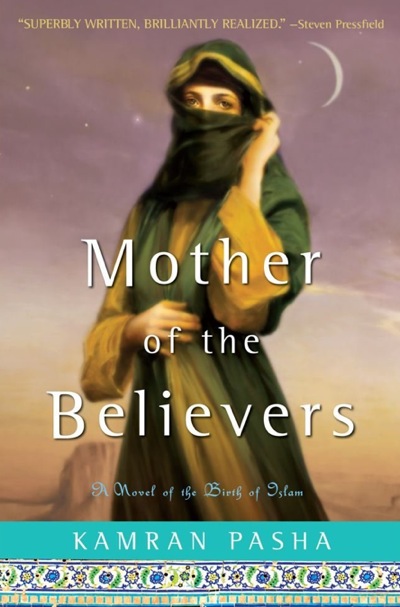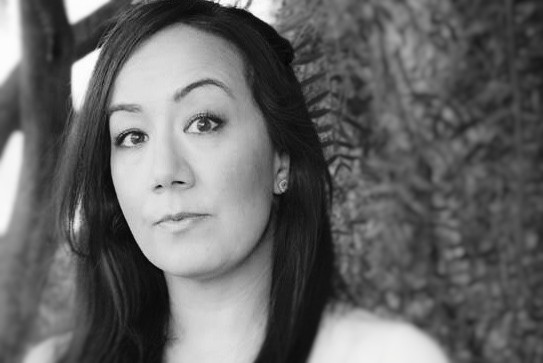Author and screenwriter Kamran Pasha shares with us an excerpt from his new novel, Mother of the Believers: A Novel of the Birth of Islam, published last month by Washington Square Press. The novel centers around the life of Aisha, the Prophet Muhammed’s youngest wife:
I was born in blood, and its terrible taint would follow me all my life.
My mother, Umm Ruman, cried out in agony as the contractions increased in severity. The midwife, a stout woman from the tribe of Bani Nawfal named Amal, leaned closer to examine the pregnant woman’s abdomen. And then she saw it. The line of blood that was running down her patient’s thigh.
Amal looked over to the young girl standing nervously to the side of the wooden birthing chair where her stepmother was struggling to bring forth life.
“Asma,” she said in a soft voice, trying to mask the fear that was growing in her chest. “Get your father.”
Your mother, Abdallah, was no more than ten years old at the time, and she paled at Amal’s words. Asma knew what they meant. So did Umm Ruman.
“I am dying,” Umm Ruman gasped, her teeth grinding against the pain. She had known something was wrong the moment her water broke. It had been dark and mottled with blood, and the subsequent horror of the contractions was far beyond anything she had experienced at the birth of her son, Abdal Kaaba, so many years before.
At the age of thirty-eight, she had known that she was too old to bear another child safely and had greeted the news of her pregnancy with trepidation. In the Days of Ignorance before the Revelation, perhaps she would have turned to Amal or the other midwives of Mecca for their secret draft that was said to poison the womb. But the Messenger of God had made it clear to his small band of followers that the life of a child was sacred, despite the many pagan Arab customs to the contrary. She had sworn an oath of allegiance to his hand, and she would not go against his teachings, even if they meant her demise. Unlike most of her neighbors and friends still clinging to the old ways, Umm Ruman no longer feared death. But she grieved to think that her child, the first to be born into the new faith of Islam, might not survive to see the sunrise.
Amal took her hand and squeezed it gently.
“Do not despair. We will get through this together.” Her voice was kind, but Umm Ruman could see in the stern lines around her mouth that Amal had reached her professional conclusion. The end was nigh for mother and child.
Umm Ruman managed to turn her head to her stepdaughter, Asma, who stood frozen at her side, tears welling in her dark eyes.
“Go. Bring Abu Bakr to me,” she said, her voice growing faint. She stroked the girl’s still plump cheeks. “If I die before you return, tell him my last request was that the Prophet pray at my funeral.”
Asma shook her head, refusing to face that possibility. “You can’t die! I won’t let you!”
The girl was not of Umm Ruman’s flesh, but the bond between them was as strong as that of any mother and daughter. Perhaps stronger, for Asma had chosen her over her actual mother, Qutaila, who had refused to accept the new faith. Abu Bakr had divorced his first wife, for it was forbidden for a believer to share a bed with an idol worshiper. The proud Qutaila had left their home in a furious rage, vowing to return to her tribe, but Asma had refused to go with her. The girl had chosen the Straight Path, the way of the Messenger and her father, Abu Bakr. That had been three years ago, and Asma had not seen her mother since. Umm Ruman had felt sorry for the abandoned child, still too young to understand the enormity of her choice, and had raised the girl as her own.
She wondered what would happen to Asma once she was gone. Abu Bakr would likely look for a new wife, but there were only a handful of believers, and the Message was spreading slowly because of the need for secrecy. If the pagan leaders of Mecca learned the truth of what the Prophet was teaching, their wrath would be kindled, and the tiny community the believers had founded in the shadows would be exposed and destroyed. In all likelihood, Asma would be alone, without any foster mother to guide her through the journey of womanhood. The girl was past due for her cycles, which usually began at the age off ten or eleven for those born under the harsh Arabian sun. The menstrual flow would erupt any day now, but Umm Ruman would not be there to comfort her through the shock of first blood.
She ran her hand through Asma’s brown curls, hoping to bequeath a soft memory with her touch that would comfort the child in the days to come. And then a shock of pain tore through Umm Ruman’s womb and she screamed.
Asma broke free of her stepmother’s grasp. She fell back, stumbling over one of the bricks that the midwife had placed at Umm Ruman’s swollen feet. As Amal searched desperately through her midwife’s stores for a salve to ease her patient’s agony, the girl turned and ran in search of her father.
Umm Ruman closed her eyes and said silent prayer even as her body burned from within.
As her uterus contracted with increasing urgency, she could feel the baby shifting, preparing to emerge into the world. A process that in all likelihood would lead to her death, and possibly the baby’s as well.
It was the beginning of the end, she thought sadly.
Umm Ruman was right. But in ways she could not have expected.
(The above is an excerpt from the book Mother of the Believers: A Novel of the Birth of Islam by Kamran Pasha. Copyright ©2009 Kamran Pasha)
Kamran Pasha, author of Mother of the Believers: A Novel of the Birth of Islam, is an acclaimed Hollywood screenwriter and television producer. Born in Pakistan, he came to the United States at the age of three, growing up in Brooklyn, New York. Learn more about Mother of the Believers: A Novel of the Birth of Islam at http://www.kamranpasha.com





